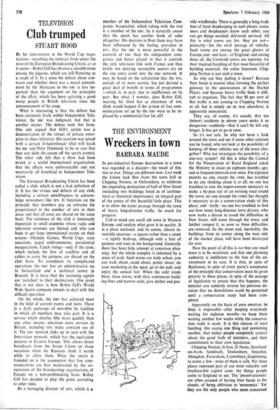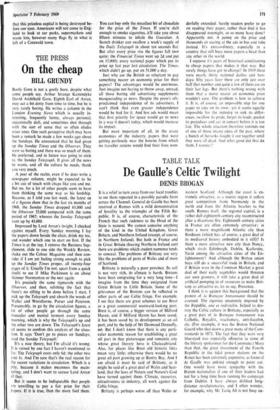Wreckers in town
THE ENVIRONMENT BARBARA MAUDE
In pre-industrial Europe destruction in a town was regarded as a disaster—the result of fire, riot or war. Things are different now. Last week the Union Jack flew from the town hall at Chipping Norton, in Oxfordshire, to celebrate the impending destruction of hall of New Street (including two buildings listed as of architec- tural or historical importance), an integral part of the centre of this beautiful little place. This is to allow the easier passage through the town of heavy long-distance traffic. So much for progress.
Call to mind any small old town in Western Europe, and analyse what gives it its quality. It is a place enclosed; and its centre, almost in- variably spacious—a square rather than a street —is tightly built-up, although with a hint of gardens and trees in the background. Generally there has been little attempt at conscious plan- ning; but the whole complex is informed by a sense of scale. Such towns are truly urban; you can walk about, stand about, potter about; do your marketing in the open; go to the pub; and enjoy the annual fair. When the cold winds blow, these towns, with their continuous build- ing-lines and narrow exits, give shelter and pro- vide windbreaks. There is generally a long.tradi- tion of local shopkeeping in such places; custo- mers and shopkeepers know each other; you can get things mended, delivered, serviced. All this is what towns are for; they are not- primarily—for the swift passage of vehicles. Such towns are among the great glories of Europe and—not least—of England; and among them all, the Cotswold towns are supreme, for their inspired handling of that most beautiful of building materials. the oolite limestone. Chip- ping Norton is just such a town.
So why are they pulling it down? Because New Street is narrow (thus forming the perfect gateway to the spaciousness of the Market Place); and because heavy traffic finds it diffi- cult to negotiate. The fact that 80 per cent of this traffic is not coming to Chipping Norton at all, but is simply on its way elsewhere, is apparently immaterial.
They say, of course, it's unsafe; that ten (minor) accidents in eleven years make it so dangerous—suddenly—that it can't be left any longer. It has got to go at once.
So it's not safe. So why not have a look around the town and see if some other solution can be found; why not look at the possibility of keeping all these vehicles out of the town alto- gether? Why not investigate the possibility of a one-way system? All this is what the Council for the Preservation of Rural England asked the Ministry to insist on eighteen months ago; and at frequent intervals ever since. For eighteen months no one, except the CPRE, has troubled to do any thinking about it at all; no one has troubled to cost the improvements necessary to make a by-pass out of an existing road round the town; no one (except the CPRE) has thought it necessary to do a conservation study of this place; and—lastly—no one has troubled to find out how many long-distance lorry drivers, who now make a detour to avoid the difficulties in New Street, will come through the town, and further congest it, as soon as these difficulties are.removed. So the street and, inevitably, the buildings from its corner along the west side of the market place, will have been destroyed for ever.
Now the point of all this is not that one small town is to be mutilated, and that one planning authority is indifferent to the fate of the en- vironment in its care. It is that, in spite of Buchanan, in spite of every party's acceptance of the principle that conservation must be given priority in these places, in spite of the passage of legislation to ensure that this happens, the minister can suddenly reverse his previous de- cision that no demolitions could be permitted until a conservation study had been com- pleted.
Apparently on the basis of pure emotion, he finds it impossible—after keeping everybody waiting for eighteen months—to keep them waiting another few weeks while the conserva- tion study is made. It is this climate of total humbug, this saying one thing and permitting another, that makes people completely cynical about the good faith of ministers, and their commitment to their own legislation.
Chipping Norton, St Ives, St Neots, Stratford- on-Avon, Sandwich, Tewkesbury, Streatley, Abingdon, Faversham, Canterbury,Godalming, to name a few—none of them is safe. Yet these places represent part of our most valuable and irreplaceable capital asset; the things people come to England to see. The 'preservationists' are often accused of having their heads in the clouds; of being oblivious to 'economics.' Yet they are the only people who seem concerned that this priceless capital is being destroyed be- fore our eyes. Americans will not come to Eng- land to look at car parks, supermarkets and waste lots, however-many flags fly in what is left of a Cotswold town.







































 Previous page
Previous page